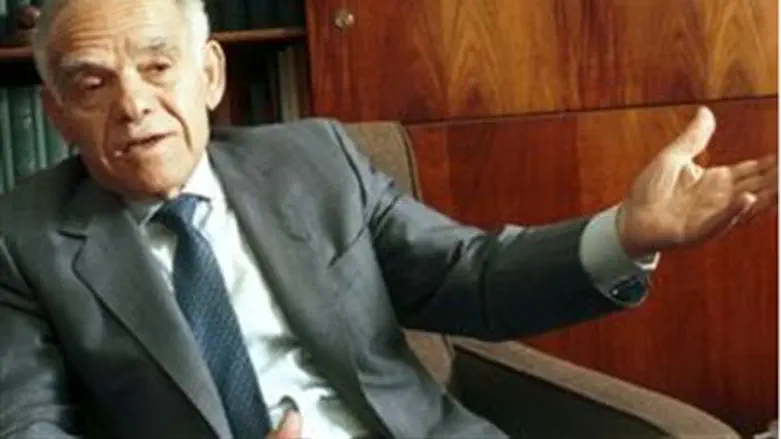
Former Israeli Prime Minister Yitzhak Shamir celebrated his 95th birthday this past week.
Shamir, who was born in Ruzhany, Russian Empire in 1915, immigrated to what was then the British Mandate of Palestine in the 1930s. He joined the Etzel, one of the underground Jewish militia organizations that opposed the British Mandate, and later joined the militant faction Lehi. After the Israeli Declaration of Independence in 1948, he joined the Mossad and served there until 1965.
Shamir was first elected to the Knesset in 1973 as a member of the Likud. He became Speaker of the Knesset in 1977, and foreign minister in 1980. In 1983, he became Prime Minister after the retirement of Menachem Begin. When an indecisive election was held in 1984, a national unity government was formed between Shamir and Shimon Peres. As part of the agreement, Peres was Prime Minister until September 1986 when Shamir took over.
Known as a hard liner in the Likud, Shamir was re-elected in 1988, but was forced to give in to US demands and participated in the Madrid talks in 1991. His narrow right wing government collapsed as a result and new elections were called. Shamir was defeated by Yitzhak Rabin and stepped down from the Likud leadership in March 1993. Since 2004, he has been living in a nursing home due to declining health.
In honor of Shamir’s 95th birthday, Arutz7 spoke on Thursday with Yossi Ben Aharon, who served as Director General in the Prime Minister’s Office when Shamir was Prime Minister, and had worked with him for 11 years.
“Yitzhak Shamir had a warm heart,” said Ben Aharon. “He was a leader who knew what is good for the people of Israel in the Land of Israel. He knew how to fearlessly implement his principles, even when he spoke with world leaders. Many leaders did not like his way, especially with regard to Israel and the Arabs. He constantly had to deal with the formula set before him by the Americans who thought they had invented the redeeming formula of land in exchange for peace.”
Ben Aharon pointed out that Shamir always knew to ward off American attacks on the issue of ‘settlements’, which he said came up often when George H. Bush was US President. “One time, Secretary of State Baker told Shamir: ‘If you think I’m an extremist, wait until you hear my boss,’” recalled Ben Aharon. “Shamir listened and did not flinch. He said that as long as there are settlements, we will guarantee that there will not be an Arab state in Israel. He told Baker that this land is our land. Today you do not hear any such bold and open statements from leaders.”
He recalled a time in 1983 when Shamir was visiting New York as Foreign Minister and was being attacked by the UN because of Israel’s actions during the First Lebanon War which was then taking place. “All of a sudden a message came from the White House that President Reagan was inviting him for a meeting in Washington. When the Israeli entourage reached the White House we were told that only two people will be allowed to accompany Shamir during the meeting with the President. Ambassador Meir Rosenne and I went with Shamir, but then we were surprised to find that across the table sat President Reagan with all his top administration aides, about 15 people.
“I felt as though the organizers of the meeting tried to give the impression that they were placing the Israelis in front of a court,” recalled Ben Aharon. “The President began speaking in a low voice, describing the harsh impression made by the Israeli invasion of Lebanon. When the President finished speaking, there was silence. Then, his voice quiet and calm, Shamir opened by expressing gratitude to the President on the endeavors to help Soviet Jews leave the USSR. The Americans were surprised. The tension in the room dissipated.”
Ben Aharon described how Shamir then explained the factual situation which led to the Israeli operation in the Lebanese border, without drama and without apology. “Shamir said that the conditions which prevailed in Lebanon left us no choice but to attack and destroy the PLO's terrorist bases, and that any responsible government in the world would have acted like us. Again there was silence in the room. Finally, Shamir suggested that the President meet with foreign and defense ministers to get a detailed picture of the situation and see what the US can do to help. Discussions with ministers took place in a businesslike manner, and no more criticism was heard. Shamir behaved this way during his entire time as Prime Minister.”
